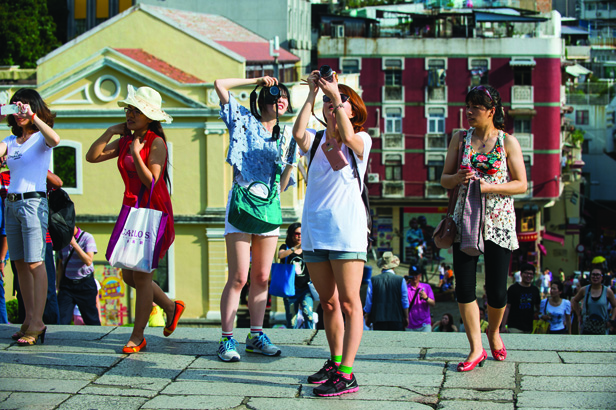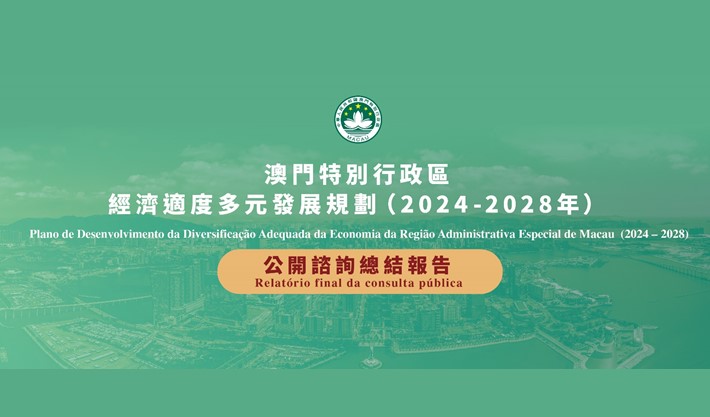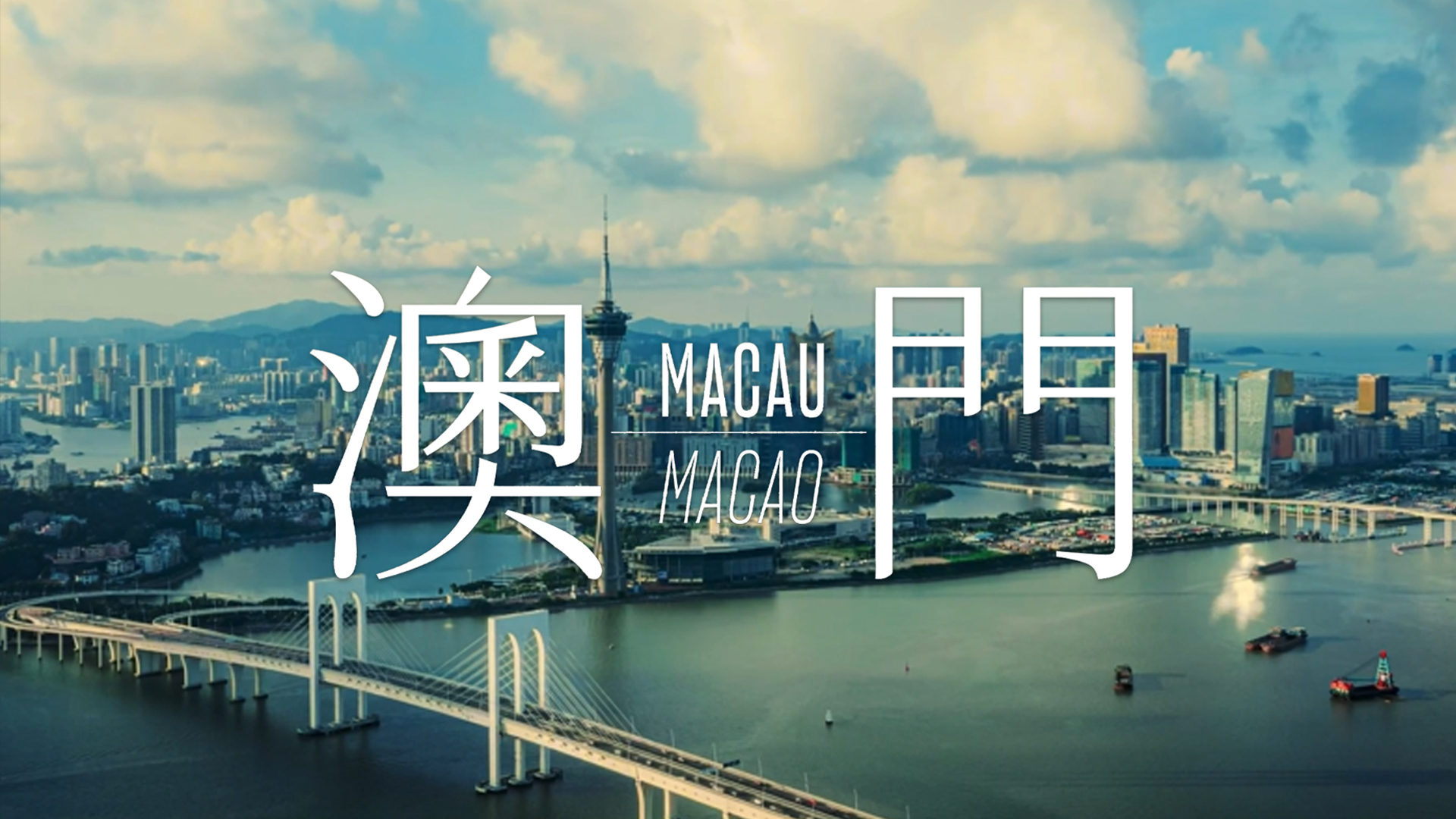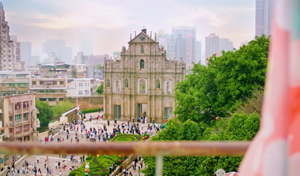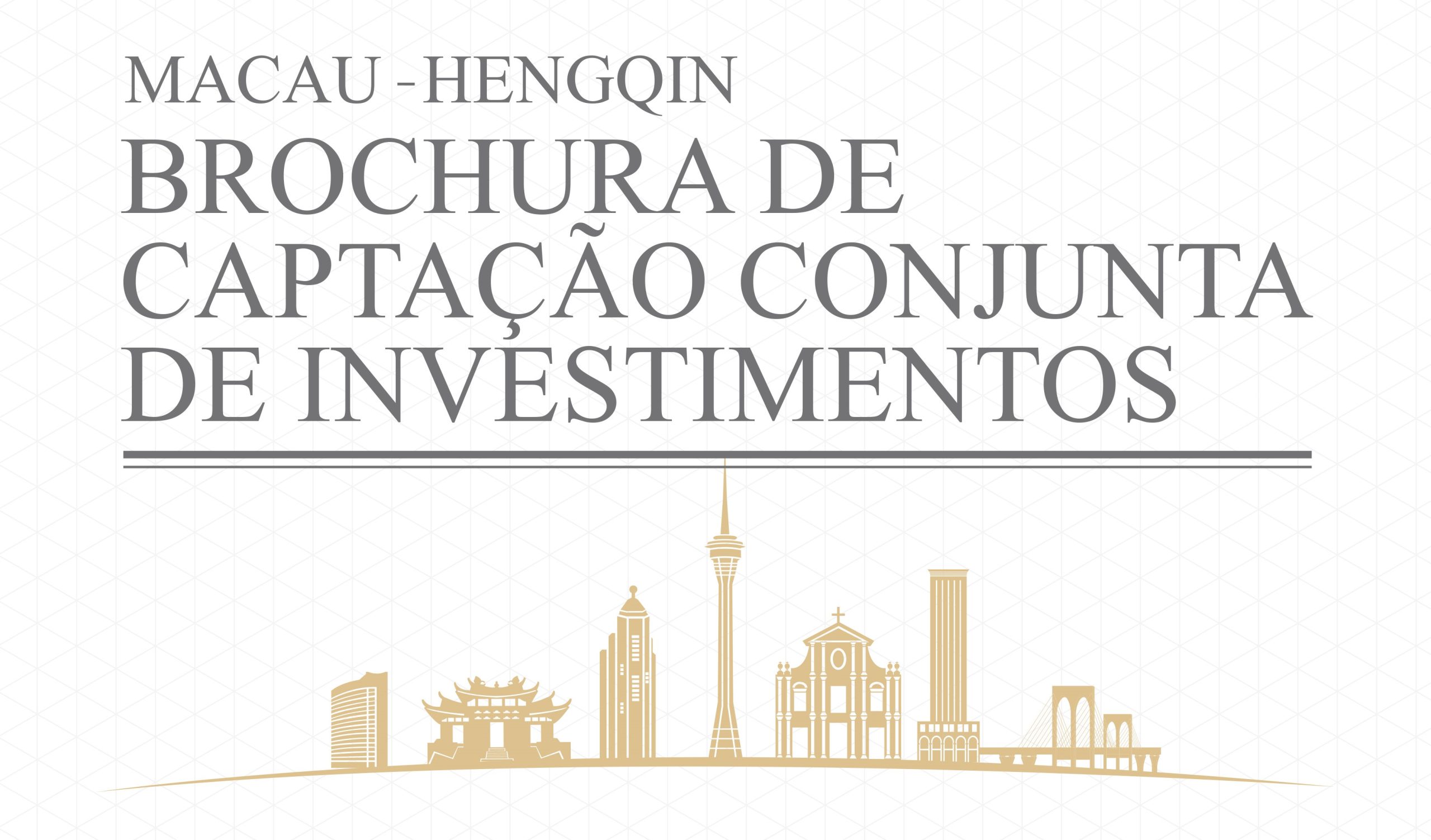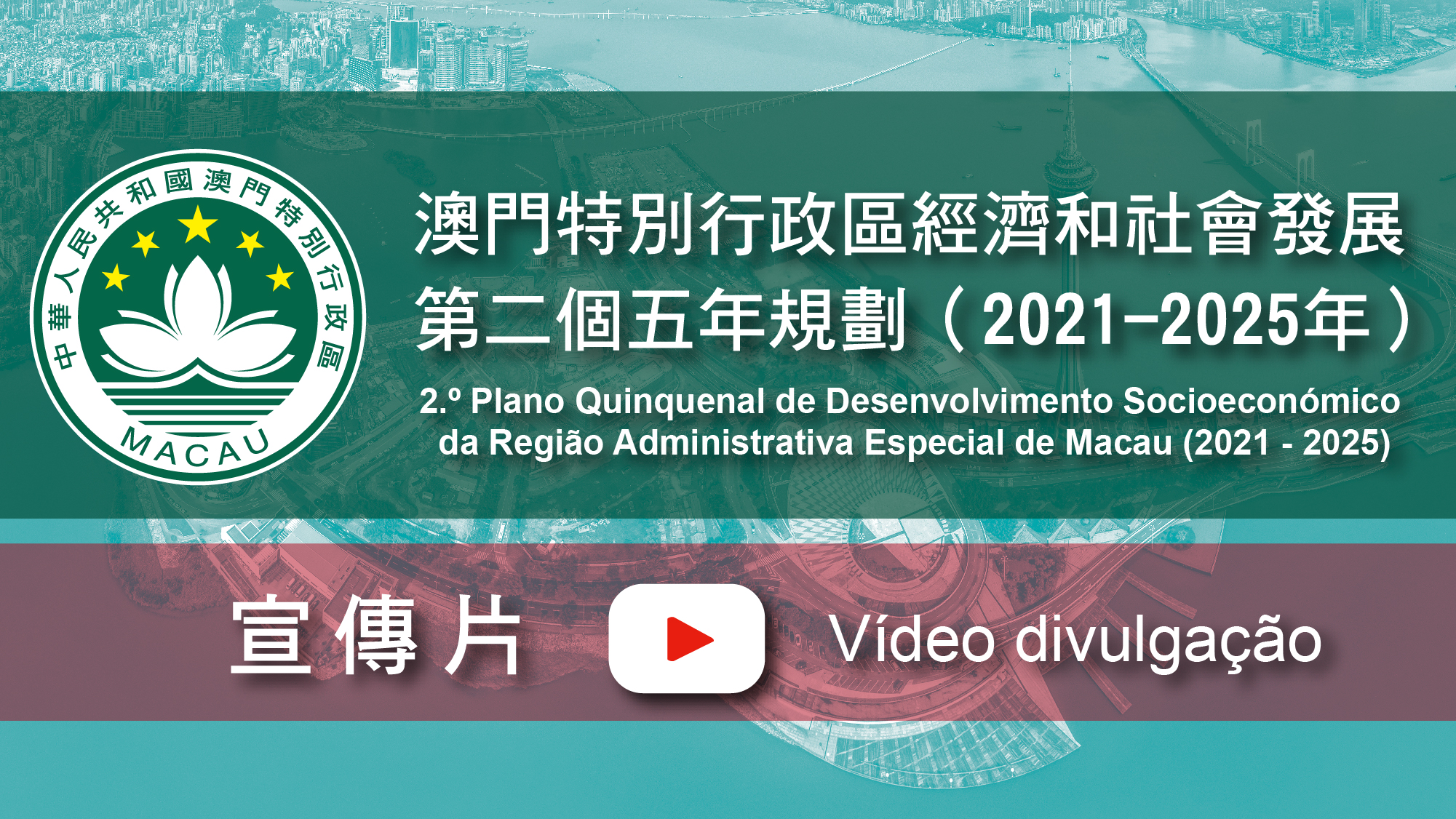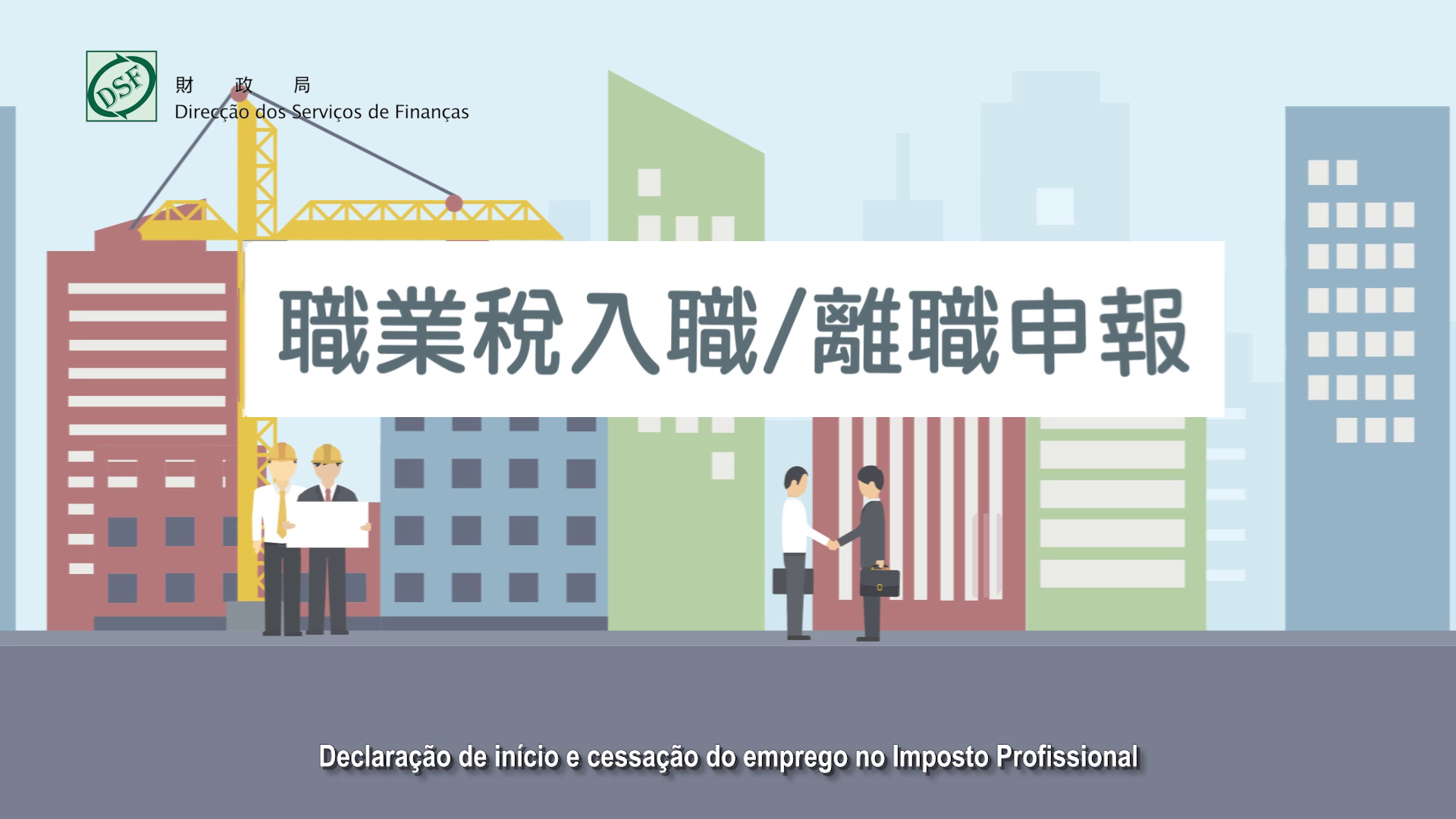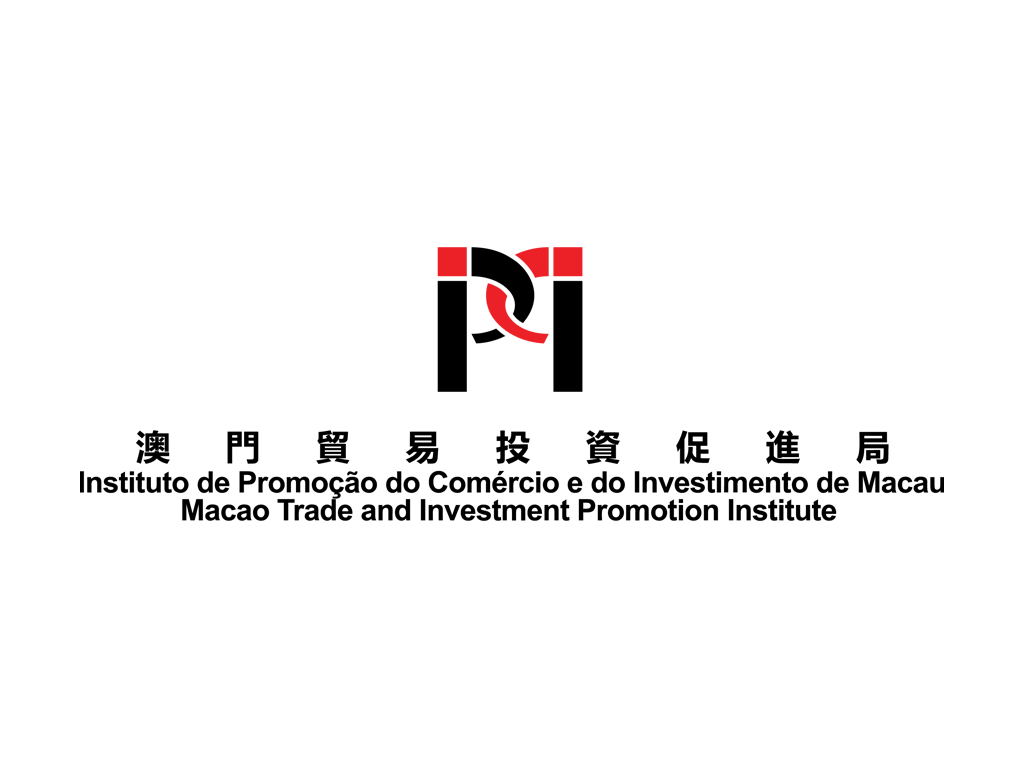Pesquisar
The Macao SAR Government launched the official document for the Five-Year Development Plan of the Macao SAR (2016-2020) in September 2016, the result being the strategic plan for Macao’s development in the short, medium and long term.
The Five-Year Plan aims to meet the need of livelihoods and steady economic growth, optimising the industrial structure, and increasing exchanges and co-operation between Macao and Mainland China on one hand and the rest of the world on the other.
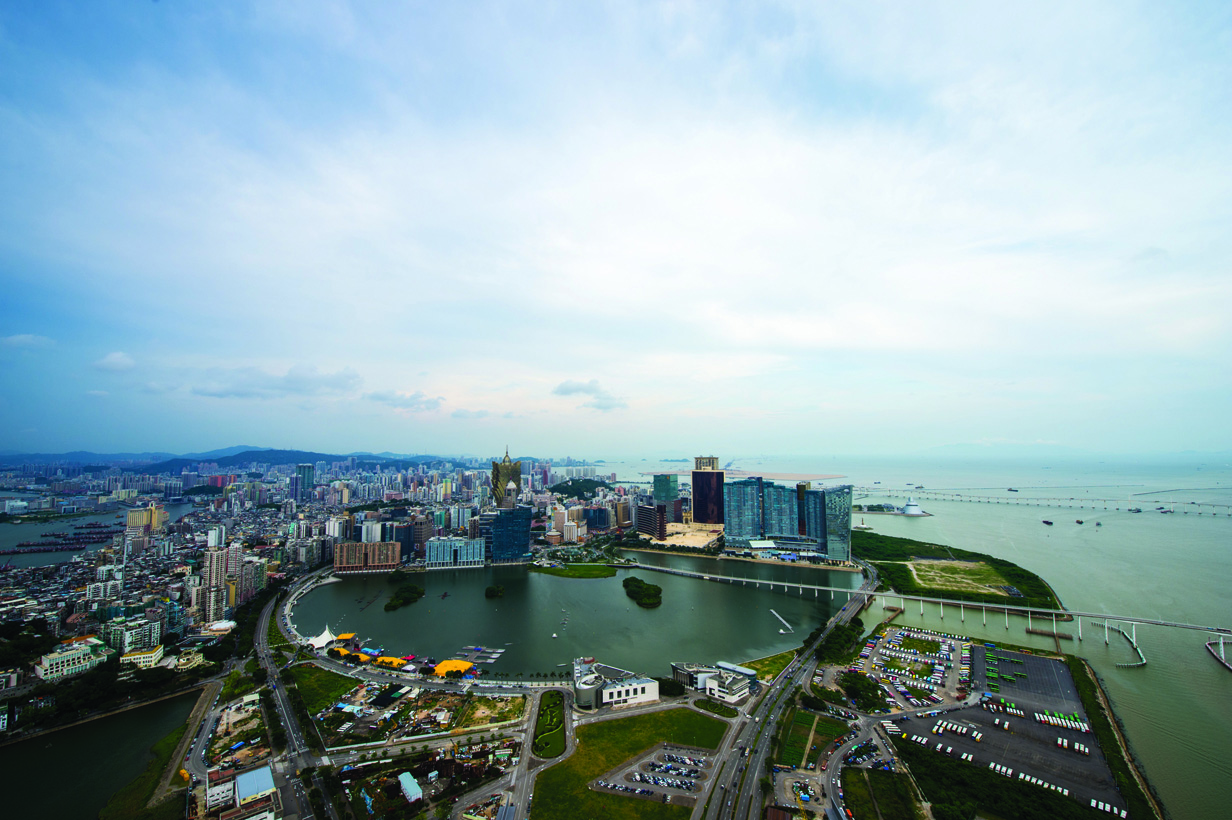
Synergistic development
The Five-Year Plan has four chapters on strategy, livelihood, development and administration. It is intended to promote the development of a city that is ideal for living, working, commuting, travelling to and from and being entertained in.
The Five-Year Plan sets seven main goals to be reached within five years: to maintain the steady development of the economy; make progress towards optimising the structure of the economy; foster the development of Macao as a city for international tourism; improve continuously the quality of life of its residents; raise the level of education and culture; achieve measurable results in protecting the environment; and enhance the Government’s administrative efficiency and develop the law. These goals are to be reached by following eight main development strategies.
The chapter in the plan on development says the Government should work diligently to promote the synergistic development of gaming and industries other than gaming. The Government should make full use of the large facilities for gaming and tourism to enhance what the city has to offer in fields other than gaming, so encouraging a wider range of services in areas such as leisure, comfort, sport and recreation, commerce, events and diversified culture, and improving the quality of these services.
After it finishes its mid-term review of the gaming industry, the Government intends to enhance the laws and regulations governing the business. It also intends to follow strategies to develop human resources in the gaming industry, lowering the proportion of employees that did not complete higher education to 76 percent by 2020 from 80 percent in 2015.
As one of the pillars of Macao’s economy, tourism is important to the city’s growth. The Government carries out research into the capacity of the Macao’s tourism industry every year. The Macao Tourism Industry Development Master Plan will be completed in 2017, detailing the goals in the short, medium and long term for the development of the industry and contribute to the improvement of the relevant laws and regulations.
In tourism, Macao wants to exploit its present markets more while nurturing new markets. The Greater Chinese market will be developed and more emphasis will be given to the markets elsewhere in Asia, Europe and the United States, Australia and New Zealand. New draws for tourists will be developed steadily, such as the attractions on Coloane and cruises in Macao’s waters. The Government will work hard to revitalise cultural and tourism resources by integrating the historical centre of Macao, the museums and the homes of historical figures that dot the city.
The Government emphasises the need to extend pedestrianised areas in the city’s main tourist districts or create more of them, to improve conditions for shopping and so stimulate communities’ economies and improve the benefits of local economies. The Government will welcome a greater role for small and medium-sized enterprises (SMEs) in big, comprehensive tourism projects, so that old shops can start their business in large tourist resorts, thus highlighting the richness and colour of what the city offers tourists.
Support for industry
Another way to promote moderate economic diversification set out in the Five-Year Plan is to nurture new businesses in emerging industries such as the meetings, incentives, conventions and exhibitions (MICE) industry, the Traditional Chinese Medicine industry, and cultural and creative industries. By giving such industries preferential treatment and financial support, and by helping nurture human resources they can employ and improving the management levels, the Government aims to help connect emerging and traditional industries, thus widening the industrial base.
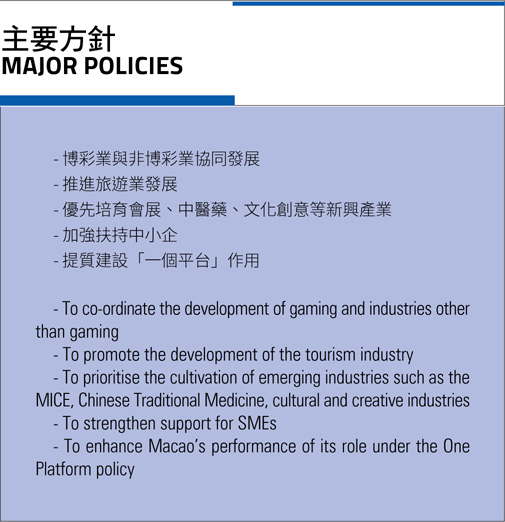 The MICE industry can help widen the industrial base and pull on the overall economy by giving work to other industries, including advertising, logistics, catering, tourism and hotels, so stimulating the city’s economy and making it more diverse. The completion of important transport infrastructure projects, such as the Hong Kong-Zhuhai- Macao Bridge, the new road between Guangdong and Macao and the Light Rapid Transit railway, will optimise Macao’s infrastructure for the MICE industry and contribute to better co-ordination with Macao’s neighbours, mutual expansion of customer base and closer co-operation within the region. The Government will give priority to the MICE industry, in an effort to accelerate the development of the business and attract big international conferences to Macao through more participation in international conference bidding, with a view to bringing more upmarket visitors to the city, resulting in a multiplier effect for the comprehensive development of a greater variety of industries and of the city’s SMEs.
The MICE industry can help widen the industrial base and pull on the overall economy by giving work to other industries, including advertising, logistics, catering, tourism and hotels, so stimulating the city’s economy and making it more diverse. The completion of important transport infrastructure projects, such as the Hong Kong-Zhuhai- Macao Bridge, the new road between Guangdong and Macao and the Light Rapid Transit railway, will optimise Macao’s infrastructure for the MICE industry and contribute to better co-ordination with Macao’s neighbours, mutual expansion of customer base and closer co-operation within the region. The Government will give priority to the MICE industry, in an effort to accelerate the development of the business and attract big international conferences to Macao through more participation in international conference bidding, with a view to bringing more upmarket visitors to the city, resulting in a multiplier effect for the comprehensive development of a greater variety of industries and of the city’s SMEs.
SMEs make up more than 90 percent of the enterprises in Macao. So the Government is planning to enhance measures to support SMEs, introducing a detailed plan to help SMEs improve their competitiveness. The Government will draft a plan of action to support SMEs which is meant to optimise present financing channels and come up with new measures and compile a booklet of guidelines for supporting the development of SMEs. With the official opening of the Guangdong Pilot Free Trade Zone, various incentives will be introduced to help Macao enterprises start new businesses and otherwise invest there. The Hengqin development project, in particular, has given Macao SMEs new opportunities.
To make SMEs more competitive, the Government will enhance the electronic payment system, looking into ways to support the business and to facilitate the work of nonbanking payment institutions in Macao. The Government will encourage SMEs to engage in electronic commerce in an effort to improve the standing of Macao’s e-commerce. Laws and regulations governing e-commerce are expected to be introduced gradually by 2020.
Apart from providing more convenient services to SMEs, the Five-Year Plan suggests revision of the Stamp Tax Regulation and of the General Stamp Tax Table with a view to reducing the operating costs of enterprises. The Government plans to set up an export credit insurance system to reduce the risk Macao SMEs take in exporting their products elsewhere.

“One Platform” role
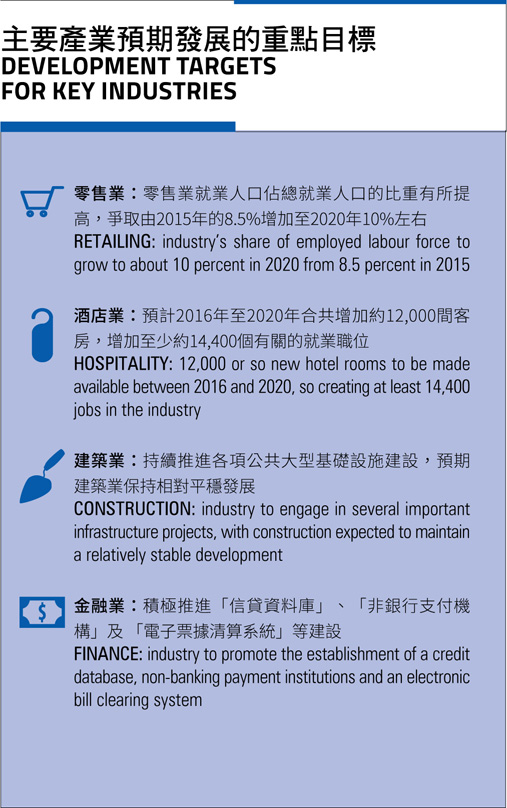 The Five-Year Plan intends to enhance Macao’s performance of its role under the “One Platform” policy. The plan says the Government will allocate part of its fiscal reserves for investment in projects financed by the National Development Bank and by the China and Portuguese-speaking Countries Co-operation Development Fund.
The Five-Year Plan intends to enhance Macao’s performance of its role under the “One Platform” policy. The plan says the Government will allocate part of its fiscal reserves for investment in projects financed by the National Development Bank and by the China and Portuguese-speaking Countries Co-operation Development Fund.
The Government will make full use of the financial services function of Macao’s role in facilitating commercial and trade co-operation between China and Portuguese-speaking Countries, nurturing a financial industry with Macao characteristics, developing financial leasing and asset management businesses. The Government will also make full use of the renminbi clearing function of Macao’s role in facilitating commercial and trade co-operation between the China and Portuguese-speaking Countries, so actively contributing to the internationalisation of the renminbi.
Macao can provide services in several areas, including translation and interpretation, finance, the law, accounting, trade and investment, so helping increase co-operation between Mainland China and Portuguese-speaking Countries. The Government will come up with plans for training people to be fluent in Portuguese, nurturing Macao Portuguese-speaking professionals and encouraging more people to acquire accredited occupational qualifications in the use of Portuguese.
Macao is working hard to build an “information-sharing platform for bilingual professionals and business cooperation, exchange and interaction between China and Portuguese-speaking Countries”, a “commercial and trade service centre for SMEs between China and Portuguese-speaking Countries”, a “food product distribution centre for Portuguese-speaking Countries” and a “centre for convention and exhibition centre for economic and trade co-operation between China and Portuguese-speaking Countries”.
More Macao and Mainland Chinese enterprises will be invited to take part in MICE events in Portuguese-speaking Countries, while efforts will be made to help more enterprises from Portuguese-speaking Countries take part in MICE events in Macao and Mainland China.
Another goal set in the Five-Year Plan is an increase of 10 percent by 2020 in the value of trade between Macao and Portuguese-speaking Countries, which was worth MOP600 million in 2015, thus encouraging more investment and co-operation in Macao from Portuguese-speaking Countries. Macao will play an active part in China’s ”Belt and Road” initiative by arranging for delegations of entrepreneurs to visit places covered by the initiative, so helping Macao and Mainland Chinese enterprises develop new markets and take new opportunities. Macao will welcome more MICE events put on by parts of the world covered by the “Belt and Road” initiative.
The “Belt and Road” initiative was added to the framework of the Forum for Economic and Trade Co-operation between China and Portuguese-speaking Countries (Macao), in an effort to increase co-operation in infrastructure between parts of the world covered by the initiative and Portuguese-speaking Countries, promoting multilateral co-operation among enterprises and expanding their respective markets.
